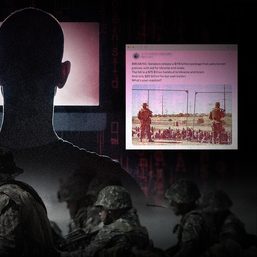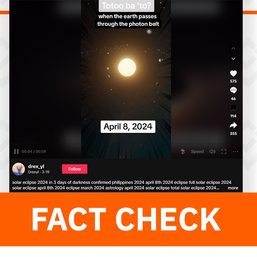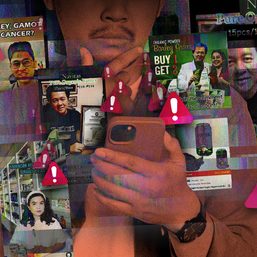SUMMARY
This is AI generated summarization, which may have errors. For context, always refer to the full article.
![[OPINION] Start with your own circle: How the pandemic turned me into a fact-checker](https://www.rappler.com/tachyon/2021/05/ispeak-infodemic-1280.jpg)
It’s surprising to find fulfillment in things I never thought I’d be interested in.
Before the pandemic happened, I was the type of Facebook user who would share posts without verifying their legitimacy. I was more inclined to post content as long as it sounded good and could possibly earn a lot of engagement. I would share things instantly without realizing the harmful effects it may cause not just to me, but also to the people around me.
Then, when the pandemic hit, the World Health Organization said that the infodemic – when there is too much information, including false or misleading information – has become a severe deterrent in combating the spread of the novel coronavirus.
For instance, I would see my Facebook friends sharing dubious posts that caused confusion and encouraged risk-taking behavior, which could really harm our community’s health.
In times of crisis, timely, reliable, and relevant information can be as critical as food and other necessities, so this moved me to change my social media habits.
I joined several fact-checking webinars led by MovePH, Rapper’s civic engagement arm, and learned how fact-checking is an absolutely vital skill that all digital citizens must have. There is really a need for critical thinking and intensive research to prevent the spread of disinformation, lies, and propaganda.
Even my relatives and friends have been victimized by false claims. However, they were not the enemy; disinformation was.
Through the webinars, I learned how to avoid being aggressive, and to establish a healthy and respectful conversation, when dealing with relatives or friends who share suspicious claims or potentially harmful messages online.
After the webinars, I realized that I still wanted to level up my skill for fact-checking. So, I decided to apply as a participant of Rappler’s fact-checking mentorship program, which was an exclusive and a hands-on training program about fact-checking methodologies. The mentorship program satisfied my drive since it was related to my college course, which was communication. It stirred my enthusiasm and served as a golden opportunity to apply all of my learnings.
Real-life test
One day, when I was scrolling through my news feed, I saw a false claim shared by a good friend. I realized this was a good situation in which to apply what I’d learned.
The claim was in a photo. It was a newspaper headline from Bulgar which said that kids could not visit their godparents’ houses during Christmas. I needed to fact-check the story as soon as possible because Christmas Day was nearing.
While working on the story, I realized that fact-checking really took time and effort. It was like digging a tunnel using a spoon. But I managed to finish debunking the claim with the help of Rappler’s fact-checking team, who guided me all throughout the process.
My first fact-checking story was published last December 24. And seeing my name after the story was a great yet humbling Christmas gift. But more importantly, I was able to tell my friend that the photo he shared was false in a way that would not offend or insult him.
All in all, I was able to publish four fact-checking stories, which all came from claims made in my own circle – my relatives and friends on Facebook.
One was about Puregold offering coupons for 1 hour free shopping, which was shared to our family chat group. The other two were about Leyte 4th District Representative Lucy Torres-Gomez confirming her senatorial candidacy and bicycle registration now being required, which were both shared by a high school schoolmate.
If there’s one thing that went well for me during this pandemic, it’s that the crisis turned me into a responsible digital citizen and fact-checker.
False information is rampant nowadays, and we do not have to go far to find suspicious claims. They could be lurking in family chat groups and friends’ news feeds. Start where you are. By discrediting these false claims, you can make a difference within your own community. – Rappler.com
Owenh Toledo, a participant of Rappler’s fact-checking mentorship program, is a 3rd year communication student from College of the Immaculate Conception in Cabanatuan City.
Add a comment
How does this make you feel?


![[Time Trowel] Evolution and the sneakiness of COVID](https://www.rappler.com/tachyon/2024/02/tl-evolution-covid.jpg?resize=257%2C257&crop=455px%2C0px%2C1080px%2C1080px)







There are no comments yet. Add your comment to start the conversation.